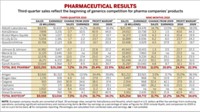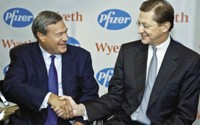Advertisement
Grab your lab coat. Let's get started
Welcome!
Welcome!
Create an account below to get 6 C&EN articles per month, receive newsletters and more - all free.
It seems this is your first time logging in online. Please enter the following information to continue.
As an ACS member you automatically get access to this site. All we need is few more details to create your reading experience.
Not you? Sign in with a different account.
Not you? Sign in with a different account.
ERROR 1
ERROR 1
ERROR 2
ERROR 2
ERROR 2
ERROR 2
ERROR 2
Password and Confirm password must match.
If you have an ACS member number, please enter it here so we can link this account to your membership. (optional)
ERROR 2
ACS values your privacy. By submitting your information, you are gaining access to C&EN and subscribing to our weekly newsletter. We use the information you provide to make your reading experience better, and we will never sell your data to third party members.
Business
U.S. Pharma's Cholesterol Woes
First-quarter earnings reflect turmoil in the cholesterol-lowering market
by Lisa M. Jarvis
May 19, 2008
| A version of this story appeared in
Volume 86, Issue 20
U .S. DRUG COMPANIES' first-quarter results once again reflected the industry's heavy reliance on cholesterol drugs. At this time last year, investors were preoccupied with the impact of generic versions of Merck & Co.'s Zocor on sales of Pfizer's Lipitor and other products. Now investors are concerned about the overall health of the cholesterol-lowering drug category.
New data calling into question the efficacy of Vytorin, a newer cholesterol drug from Merck and Schering-Plough, emerged in the quarter. The information is prompting doctors to rethink how to treat patients and appears to be driving regulators to toughen standards for drugs in the pipeline.
Merck and Schering-Plough, which both only recently enjoyed rebounds in sales and profits after several tough years, now face new hurdles. During the quarter, the companies finally released results from a clinical trial called Enhance that was designed to demonstrate Vytorin's ability to significantly lower cholesterol while lessening plaque build-up on the walls of arteries—a marker for risk of heart attacks and related diseases.
Instead, the study showed Vytorin was no better than older drugs at preventing plaque from growing. The finding bucked conventional wisdom that getting "bad" cholesterol as low as possible would translate into fewer heart events. In late March, a panel of cardiologists said that doctors should put Vytorin in the back seat behind statin drugs such as Lipitor when treating heart disease.
First-quarter sales of Vytorin and its sister product Zetia were still up 6% to a combined $1.2 billion. However, the quarter-over-quarter picture was not so rosy: the drugs had racked up $1.5 billion in sales in the fourth quarter of 2007, a 34% improvement over the prior year. According to market analysis by Deutsche Bank, the number of prescriptions for the products fell 13% from fourth quarter 2007 to first quarter 2008, with the companies losing about 3% of their share of the cholesterol drug market. A 50% decline in market share for the franchise "seems plausible," says Deutsche Bank analyst Barbara Ryan.
At Schering-Plough, however, other developments muted the impact of a slowdown of its Zetia/Vytorin franchise. The company benefitted from its smooth integration of recently acquired Organon Biosciences, cost-cutting efforts, and healthy sales growth for its other products. And it enjoyed a 35% increase in first-quarter earnings to $862 million, based on a 56% jump in sales to $4.7 billion.
Schering-Plough's portfolio of allergy medicines, which includes Nasonex, Clarinex, and Claritin, grew steadily, despite competition from both branded and generic products. Meanwhile, its bottom line got a boost from the arthritis treatment Remicade, which posted a 36% increase in sales to $507 million, and the brain tumor treatment Temodar, which had a 20% increase in sales to $236 million.
At Merck, sales were up just 1% to $5.8 billion, while earnings improved 6% to $1.9 billion. Sales of newer drugs helped. The cervical cancer vaccine Gardasil brought in $390 million, an 8% increase, and the diabetes treatment Januvia took in $272 million, more than triple its sales for the 2007 period.
YET THE OUTLOOK for Merck is cloudy. Two congressional committees are investigating whether Merck and Schering-Plough delayed releasing the Enhance trial information to protect their franchise. And in recent weeks, the Food & Drug Administration dealt Merck a series of blows by deeming a combination allergy drug and a new cholesterol treatment nonapprovable and then by issuing a warning letter for deficiencies at its West Point, Pa., vaccines manufacturing facility. In the aftermath, the company announced plans to cut 1,200 sales jobs in the U.S. (C&EN, May 12, page 21)
FDA's rejection of Cordaptive, a cholesterol drug that combined extended-release niacin with laropiprant, could have the biggest impact on Merck's financial well-being. The nonapproval "is clearly an important setback," Deutsche Bank's Ryan wrote in a note to investors. "Merck had previously stated that it plans to file a new drug application for a triple combo of Cordaptive and Zocor later this year, and at this juncture, we have no idea as to whether this plan will change," she added.
Though Merck says it plans to submit more data to elucidate Cordaptive's risk-to-benefit balance, the agency's decision suggests growing caution surrounding new cholesterol treatments.
Just a week before Merck's bad news, Genzyme and Isis Pharmaceuticals said FDA was asking for more data for their new drug application for mipomersen, an antisense drug that inhibits the production of a protein responsible for the synthesis and transport of low-density lipid cholesterol. The agency wants the companies to prove that the drug not only lowers cholesterol but also actually reduces the risk of heart attack. The additional study will delay the application by a year to 2010. Taken in sum, the string of setbacks has pushed Merck's stock price down more than 30% since the start of the year.
The cholesterol-lowering business continues to be the focal point at Pfizer as well. Lipitor, by far Pfizer's biggest seller, has just two years of patent life left, and the company is scrambling to find ways to offset the looming loss.
And Pfizer is already getting a taste of life without Lipitor. Competition from generic Zocor and other cholesterol drugs cut Lipitor's first-quarter sales by 7% to $3.1 billion. Sales growth in foreign markets helped offset some of the 18% drop in U.S. Lipitor sales, however. As a result, Pfizer's overall revenues fell 5% to $11.8 billion, while earnings slid 15% to $4.1 billion.
Higher demand in foreign markets, where sales grew 13%, propped up Pfizer's drug sales. Several newer products also helped the company's cause. The pain treatment Lyrica brought in $582 million in sales, up 47%; sales of the smoking cessation drug Chantix increased 71% to $277 million; and sales of Sutent, for kidney and gastrointestinal cancers, grew 86% to $190 million.
The company's profits might have fallen even more without cost-cutting measures. Pfizer is on track with its previously announced plan to close six R&D sites and shed another 13 plants. The moves would shrink its global manufacturing network to 44 plants. Its workforce was 85,000 in March, compared with 98,000 at the end of 2006. Overall, Pfizer's goal is to shave $1.5 billion to $2 billion from its overhead by the end of the year.
Despite the restructuring program and efforts to fortify its drug pipeline, Pfizer cannot offset the loss of patent protection on Lipitor in 2010, analysts say. Pfizer has admitted that it has been unable to find an acquisition that is the right fit at the right price.
"They are very much between a rock and a hard place," Deutsche Bank's Ryan says. Shareholders want to see the company buy assets that will provide some breathing room during the final days of Lipitor, but they will be highly critical if the company overpays for a biotech firm that can't deliver a blockbuster.
MORGAN STANLEY analyst Jami Rubin, says "We still struggle to see what Pfizer can do to grow the company post-Lipitor and the wave of additional patent expirations right after." Rubin is encouraged by the company's new biotech incubator program and its increased success in emerging markets but says those efforts are minor compared with the challenges it faces. "So far, we have seen little that gives us confidence that Pfizer has a concrete growth plan," she adds.
While a number of U.S. companies are struggling with their cholesterol franchises, the British firm AstraZeneca appears to be holding steady. Sales of its statin Crestor improved 23% to $772 million, contributing to a 10% increase in overall first-quarter sales to $7.7 billion. Earnings were up 4% to $2.3 billion.
But AstraZeneca's other blockbuster did not fare as well. Sales of the heartburn drug Nexium fell 5% to $1.2 billion, and the company recently took measures to prevent the early onset of generic competition for the drug. Last month, AstraZeneca settled a patent suit with India's Ranbaxy Laboratories in a deal that ensures Ranbaxy will not launch a generic version of Nexium before 2014. AstraZeneca is still battling patent challenges from Teva Pharmaceutical Industries and Dr. Reddy's Laboratories.





Join the conversation
Contact the reporter
Submit a Letter to the Editor for publication
Engage with us on Twitter